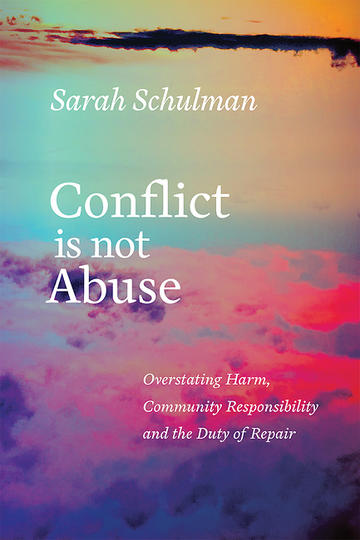About BC Books Online
BC Books Online was created for anyone interested in BC-published books, and with librarians especially in mind. We'd like to make it easy for library staff to learn about books from BC publishers - both new releases and backlist titles - so you can inform your patrons and keep your collections up to date.
Our site features print books and ebooks - both new releases and backlist titles - all of which are available to order through regular trade channels. Browse our subject categories to find books of interest or create and export lists by category to cross-reference with your library's current collection.
A quick tip: When reviewing the "Browse by Category" listings, please note that these are based on standardized BISAC Subject Codes supplied by the books' publishers. You will find additional selections, grouped by theme or region, in our "BC Reading Lists."
 Enlarge Cover
Enlarge Cover
From intimate relationships to global politics, Sarah Schulman observes a continuum: that inflated accusations of harm are used to avoid accountability. Illuminating the difference between Conflict and Abuse, Schulman directly addresses our contemporary culture of scapegoating. This deep, brave, and bold work reveals how punishment replaces personal and collective self-criticism, and shows why difference is so often used to justify cruelty and shunning. Rooting the problem of escalation in negative group relationships, Schulman illuminates the ways in which cliques, communities, families, and religious, racial, and national groups bond through the refusal to change their self-concept. She illustrates how Supremacy behaviour and Traumatized behaviour resemble each other, through a shared inability to tolerate difference.
This important and sure to be controversial book brings insight into contemporary and historical issues of personal, racial and geo-political difference, as tools of escalation towards injustice, exclusion and punishment, whether the objects of dehumanization are other individuals in our families or communities, African Americans at the hands of police, people with HIV, and Palestinians. Conflict Is Not Abuse is a searing rejection of the cultural phenomenon of blame, cruelty, and scapegoating, revealing how those in positions of power exacerbate and manipulate fear of the "other" to avoid facing themselves.
With awesome brilliance and insight, Sarah Schulman offers readers new strategies to intervene on all relations of domination both personal and political. The core of this book provides ways to think and move beyond blaming and/or assuming victimhood -- so that each of us may come to understand the role we assume in creating and sustaining conflicts in all our relations. Sharing myriad ways, critical vigilance can help us all understand that conflict need not be viewed as abuse, that essential distinctions may be made between the hurt we experience in conflict and the violence of abuse, Schulman offers a vision of mutual recognition and accountability that liberates. “bell hooks
Schulman's new work is a provocative rethinking of intimate and civil discourse for a rapidly shrinking world ... a rallying cry for civil engagement and engaged civility. “Gay City News
Conflict Is Not Abuse presents a gestalt shift in thinking about conflict, power relations, harm and social responsibility. “The Globe and Mail
Conflict's publication could not be timelier ... A sharply observant and relevant text that is already getting its wish for action granted. “Lambda Literary
A compelling call out of call-out culture and everything that it messily dredges up, brings forward, and shunts away. “Canadian Art
It's impossible to be invested in the world and not be invested in this groundbreaking and challenging book. From a position of artist and social critic, Sarah Schulman gives us a detailed and considered reading of some of our most overly determined and venomous conflicts. Conflict Is Not Abuse is a book to interrogate, ponder, and discuss. “Claudia Rankine
Conflict is Not Abuse should prove to be essential reading for people interested in psychology, group dynamics, and social justice activism. “Global Comment
Schulman's book could not have come at a better time ... Conflict is a balm against comforting explanations for violence and abuse, ones we know aren't true, just easy. “Village Voice



